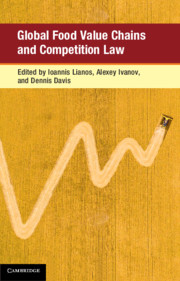Book contents
- Global Food Value Chains and Competition Law
- Global Competition Law and Economics Policy
- Global Food Value Chains and Competition Law
- Copyright page
- Contents
- List of Authors
- 1 Global Food Value Chains
- 2 Rents, Power and Governance in Global Value Chains
- 3 The Financialization of Land and Agriculture
- 4 Agriculture, End to End
- 5 New Forms of Financing the Agricultural Sector in Brazil
- 6 Economic Concentration and the Food Value Chain
- 7 The State of American Competition Law with Respect to the Food Chain
- 8 The Brazilian Food Value Chain and Competition Policy
- 9 Competition Concerns in Fertilizer Import-Dependent Countries like India and China
- 10 Russian Competition Policy Over Value Chains in Agricultural and Food Sectors
- 11 The Pioneer/Pannar Merger, the Maize Seed Value Chain and Globalisation
- 12 Power in the Food Value Chain
- 13 Efficiency and Fairness
- 14 China’s Legal Regulation of the Abuse of Market Power by Large Retailers
- 15 Superior Bargaining Power in Russian Contract and Competition Law
- 16 Regulating Unfair Trading Practices in the EU Food Supply Chain
- 17 Food Chain Certification and the Social Pluralism of Competition Law
- 18 Hunger Games
- 19 Agribiotech Patents in the Food Supply Chain
- 20 Mergers and Product Innovation
- 21 The Global Grain Trade
- Index
9 - Competition Concerns in Fertilizer Import-Dependent Countries like India and China
Analysing the Agrium-PotashCorp Merger
Published online by Cambridge University Press: 12 May 2022
- Global Food Value Chains and Competition Law
- Global Competition Law and Economics Policy
- Global Food Value Chains and Competition Law
- Copyright page
- Contents
- List of Authors
- 1 Global Food Value Chains
- 2 Rents, Power and Governance in Global Value Chains
- 3 The Financialization of Land and Agriculture
- 4 Agriculture, End to End
- 5 New Forms of Financing the Agricultural Sector in Brazil
- 6 Economic Concentration and the Food Value Chain
- 7 The State of American Competition Law with Respect to the Food Chain
- 8 The Brazilian Food Value Chain and Competition Policy
- 9 Competition Concerns in Fertilizer Import-Dependent Countries like India and China
- 10 Russian Competition Policy Over Value Chains in Agricultural and Food Sectors
- 11 The Pioneer/Pannar Merger, the Maize Seed Value Chain and Globalisation
- 12 Power in the Food Value Chain
- 13 Efficiency and Fairness
- 14 China’s Legal Regulation of the Abuse of Market Power by Large Retailers
- 15 Superior Bargaining Power in Russian Contract and Competition Law
- 16 Regulating Unfair Trading Practices in the EU Food Supply Chain
- 17 Food Chain Certification and the Social Pluralism of Competition Law
- 18 Hunger Games
- 19 Agribiotech Patents in the Food Supply Chain
- 20 Mergers and Product Innovation
- 21 The Global Grain Trade
- Index
Summary
With the world population rapidly increasing, achieving food security has been a recurring global challenge. Consequently, dependence on agricultural inputs such as fertilisers has continued to grow. The dependency on inorganic fertilizers is especially acute for developing countries. Paradoxically, the major developing economies that need fertilizers to meet their ever-increasing food production requirements are not self-sufficient in the fertilizer sector. In this realm, Potash is a typical case in point. Production and supply of potash has historically been controlled by international export cartels that consist of a limited number of firms. Not very recently, one of the major export cartels underwent further concentration when the Potash Corporation of Saskatchewan merged with Agrium Inc. to form the largest crop nutrient producer in the world - Nutrien. This Chapter discusses the merger and the resultant competition concerns from the perspective of two major import-dependent economies i.e. China and India. It also delineates some limitations of the merger reviews conducted by the respective competition authorities. The objective therein is to address the limitations of the standard ex-post competition analysis and to highlight the political economy issues that affect the state of competition and consumer welfare in markets that are subject to international cartels.
Keywords
- Type
- Chapter
- Information
- Global Food Value Chains and Competition Law , pp. 209 - 222Publisher: Cambridge University PressPrint publication year: 2022



